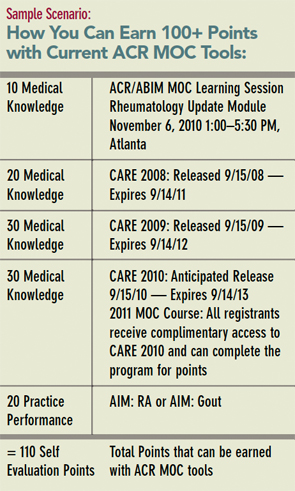
To remain board certified by the American Board of Internal Medicine (ABIM), rheumatologists who were certified in 1990 or later need to recertify every 10 years by enrolling in and completing ABIM’s Maintenance of Certification (MOC) program. The ABIM MOC program is designed to promote lifelong learning and the enhancement of clinical judgment and skills essential for high-quality patient care. To complete the ABIM MOC program, physicians need to be licensed and in good standing, pass a secure examination, and earn 100 self-assessment points: 20 points in self-evaluation of medical knowledge, 20 points in self-evaluation of practice performance, with the remaining 60 points in either medical knowledge, practice performance, or a combination of both.
The ACR has made a commitment to help all rheumatologists understand and navigate the ABIM MOC process. As part of this commitment, the ACR’s knowledgeable staff works closely with the Continuous Professional Development subcommittee to develop educational tools to assist with MOC requirements.

How to Participate in MOC
- The first step for recertification is to enroll in MOC by visiting www.abim.org/moc.
- Once you are enrolled, you may begin to complete self-evaluation modules to earn credit towards the 100 points you need for the self-assessment component of the program. While ABIM offers self-evaluation modules in internal medicine and the various subspecialties, including rheumatology, the ACR also offers rheumatology focused self-assessment tools that are eligible for MOC credit.The ACR offers two online products and two live courses to help you fulfill your recertification needs. Each program respects the resources and constraints of a busy physician. View the Sample Scenario (below) to see how you can earn 100+ MOC points using ACR tools.
- Starting in year six of your certification, you become eligible to schedule the ABIM secure exam. MOC examinations are offered twice a year by ABIM, in the spring and fall. To find exam dates and information on how to schedule your exam, visit www.abim.org/rheumexam.
I hope that the ACR MOC modules will serve as a useful guide as you navigate your way through the ABIM Maintenance of Certification program.
Visit www.rheumatology.org/education, and click on Recertification for more information about ABIM-accredited self-evaluation modules or how the ACR can help you navigate through ABIM’s MOC program. You can also call the Office of Continuous Professional Development at 404-633-3777. If you have any questions for ABIM about MOC, please call 1-800-441-2246, or visit www.abim.org/moc.
Dr. Langford is chair of the ACR Continuous Professional Development Subcommittee and the director of the Center for Vasculitis Care and Research at the Cleveland Clinic.
